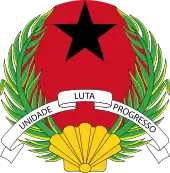Esta É a Nossa Pátria Bem Amada
"Esta É a Nossa Pátria Bem Amada" (English: "This Is Our Well Beloved Motherland") is the national anthem of Guinea-Bissau. Written in 1963 by Amílcar Cabral (1924–1973) and composed by Xiao He (1918–2010), it was adopted upon independence from Portugal in 1974.
| English: This Is Our Well Beloved Motherland | |
|---|---|
National anthem of Guinea-Bissau, Former national anthem of Cape Verde | |
| Lyrics | Amílcar Cabral, 1963 |
| Music | Xiao He, 1963 |
| Adopted | 1974 |
| Relinquished | 1996 (Cape Verde) |
| Audio sample | |
| |
It was also the national anthem of Cape Verde, a legacy of both countries' joint independence, until 1996, when a new anthem ("Cântico da Liberdade") was adopted by Cape Verde.
History
The anthem was written by independence leader of Guinea-Bissau and Cape Verde Amílcar Cabral. Cabral, a Bissau-Guinean son of Bissau-Guineans and Cape Verdeans, was the leader of the African Party for the Independence of Guinea and Cape Verde (PAIGC).[1]
In 1963, a delegation from then Portuguese Guinea visited China and heard music by composer Xiao He. Cabral asked Xiao to compose a piece that would inspire his people in their struggle for independence.[2][3] Set to a 1963 poem by Cabral, the piece was later adopted by Guinea Bissau and Cape Verde as the national anthem upon their independence from Portugal in 1974.[3][4]
In the 1990s, after the African Party for the Independence of Cape Verde allowed multi-party rule, it was decided that Cape Verde should adopt its own national symbols, including a flag and anthem.[1] A new anthem, "Cântico da Liberdade", was adopted in 1996.[4]
Lyrics
| Portuguese original[3][5] | IPA transcription[lower-alpha 1] | English translation |
|---|---|---|
I |
1 |
I |
Notes
- See Help:IPA/Portuguese and Guinean Portuguese.
References
- Mourão, Daniele Ellery (April 2009). "Guiné-Bissau e Cabo Verde: identidades e nacionalidades em construção". Pro-Posições (in Portuguese). 20: 83–101. doi:10.1590/S0103-73072009000100006. ISSN 1980-6248.
- Agency, Central Intelligence (2013-01-04). The World Factbook 2012-13. U.S. Executive Office of the President. p. 311. ISBN 978-0-16-091142-2.
- Berg, Tiago José (2012-11-26). Hinos de todos os países do mundo. Panda Books. p. 178. ISBN 9788578881917.
- Diario, Nós (16 December 2016). "Literatura para a militância nacional: hinos da lusofonia". Nós Diario (in Galician). Retrieved 2022-01-24.
- Augel, Moema Parente (2007). O desafio do escombro: nação, identidades e pós-colonialismo na literatura da Guiné-Bissau (in Brazilian Portuguese). Editora Garamond. p. 422. ISBN 978-85-7617-134-8.
External links
- Guinea-Bissau: Esta É a Nossa Pátria Bem Amada - Audio of the national anthem of Guinea-Bissau, with information and lyrics (archive link)
